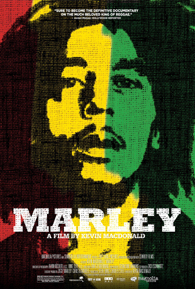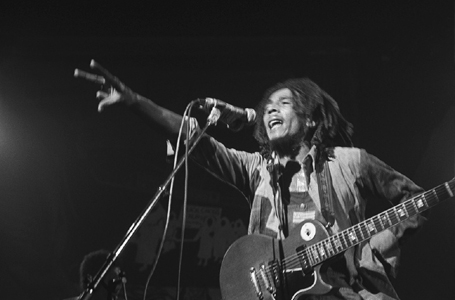
Bob Marley had never been to Singapore. He never would have been allowed here given that at the peak of the singer's international career in the late 70s, Singapore's Western-educated social democratic leaders joined hands with the Chinese intellectuals it had formerly purged from power in a war against 'yellow culture', banning from the island state musicians with long hair and drug habits. It didn't actually matter that no one in Singapore knew of any musician here who had a hard drug habit; the moral panic itself was sufficient to close down discos, ban entire genres of music, and force bands to re-engineer their images. Singapore has become a much cooler, saner, tolerant place since then but as you can see from the film's rating, there's still an element of demonising going on when it comes to rock stars like Bob Marley.
It's funny because Kevin MacDonald's no-holds-barred, unflinchingly truthful documentary acknowledges that Marley, as a Rastafarian, smoked marijuana in its sacred rituals — but never the amounts that a sensationalist press claimed, and never could suspicious police and immigration authorities in various countries find any trace during his world tours.
But enough about sex (Marley apparently believe in free love even though he was married, another aspect of the singer shown in the documentary) and drugs. Marley as a documentary clears away the cobwebs of myth and hearsay that have built up since Bob Marley's early death to offer the modern world a greater understanding of the man and his music.
Going chronologically from the birth of Robert Nesta Marley in rural Jamaica to his childhood in Kingston and growth from a young man and novice to a spokesperson for reggae music, Kevin MacDonald's documentary puts Bob Marley and his music in proper personal and historical context.
Through interviews with Marley's colleagues and contemporaries (who are very much in their prime given his very early death), family and lovers, and often rare bootleg footage of his live concerts, we get to see the very personal and very spiritual roots of his music. These aren't just well-written songs from an idealistic era that we'll never see the likes of again; these are eloquent songs that were written from the heart, that cared about spirituality, about freedom and oppression. These aren't songs about general ideals; these are songs that commented on the immediate neighbourhood that Bob Marley lived in, the political and economic challenges that his people chafed under.
In his telling of Marley's life and the airing of his music, Kevin MacDonald's documentary performs a most magical act — that we might see what idealistic flower children, political dictators, and independent fighters alike saw in Bob Marley's music and like them, partake a little in the heaven that his music delivered.

